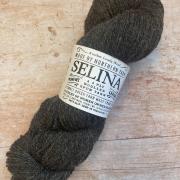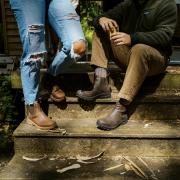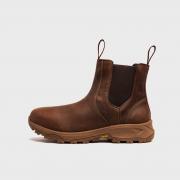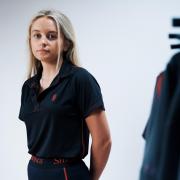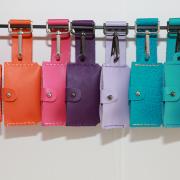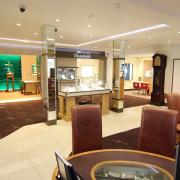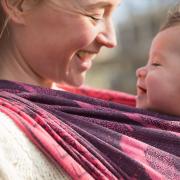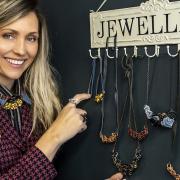Lancashire designers and makers took centre stage at the first Best of Britannia event to be held outside London. Words by Martin Pilkington
The Best of Britannia project began in 2012 in London, aiming to showcase the finest British brands and craftsmanship. BOB North, the first satellite version seeking to do the same on a regional basis, chose Preston as its venue. And it did so with style in the old Post Office building on the historic Flag Market.
‘It’s a great setting for the show,’ said Antony Wallis, one of BOB’s directors. ‘Marketing Lancashire persuaded us to look at it as a venue and it’s great - a warren of rooms with real charm, much more interesting for exhibitors and visitors than some huge flat shed.’
Sir Henry Tanner’s long disused building is full of character, a quality that defines so many of the products on display at BOB North. Furniture made by The Odd Chair Company based at Woodplumpton, for example. ‘We’re the only traditional upholstery company in the UK still doing everything by hand, including horsehair wadding tied traditionally as it would have been 100 years ago,’ said upholsterer Joe Vurley.
And design director James Cook added: ‘They are legacy pieces that will last for generations. Our clients appreciate that they are only buying once, not every year or so.’
Roach Bridge Tissues of Samlesbury make the fine paper used by the likes of Fortnum & Mason, to wrap goods. The printing and designs are so beautiful that it seems tragic the product is ephemeral – unlike the company. ‘Roach Bridge Mill has been in this business for 175 years,’ said director Camilla Hadcock. ‘We no longer make paper there, and nobody in England makes tissue so we import most from France, but all the printing and cutting is done on site.’
Paper is at the heart of what Katie King does too, though her sculptures, lampshades, maps and portraits are more enduring. ‘I started off doing illustration in my degree course at the university centre at Blackpool & Fylde College. A visiting lecturer called Su Blackwell inspired me to do the paper sculpting. Everything is hand-cut with a scalpel, built up with multiple layers. I love playing with the shadows to give depth and transform the image.’
Deni Deni of Haslingden work with leather rather than paper, but with the same finicky craftsmanship. Top Shop Unique are among their clients now, and the royal household has 50 or so of their handbags, a far cry from the company’s origins in a windowless room above a car workshop in Bury. Founder Denise Pearson, who has been in the industry for 30 years, said: ‘Everything is handmade, hand cut, hand inked. We make pretty much anything in leather other than settees – even tablet covers and clothes hangers.’
Leather dominates Swift & Co’s range too, in the form of shoes and boots that retail for about £150 an elegant pair. ‘Shoe manufacturing is in my blood,’ said managing director Richard Swift. ‘My father was in the footwear trade in Rossendale before all that went. This is a sort of phoenix from the ashes. Shoes are made using fewer operations, so it’s less labour intensive and we can afford to manufacture in Burnley instead of China.’
David Chadwick of Carradice, bike bag manufacturers in Nelson, shares that aim. ‘I’m passionate about manufacturing in the UK,’ he said. The company, which makes for fellow flag-flyers Brompton Cycles among others, has been in business since 1932, and today employs 20 people. Most of their bags are in leather and canvas, but they recently launched a new brand, UPSO. ‘We use old lorry tarpaulins – given a good wash – and discarded fire-service hoses for the materials,’ David added. The results have instant patina, individuality, and toughness. Street cred with style.
Galgate company Scomadi produces a different sort of bike. Founders Frank Sanderson and Paul Melici are Lambretta fans who decided to offer a new generation scooters with that sense of style, but with new design touches and modern technology. ‘They began with 30 limited edition models made here, but now for volume manufacture we’ve had to go to China,’ said Frank’s wife Kaye. Happily they hope to assemble and customise the top-of-the-range models in Galgate still.
The companies showcased at BOB North ranged from one-man-bands to major manufacturers; from the artisan to the industrial. What they have in common, however, is that their products are fired with imagination and they want their labours to result in an end product. The last word goes to the longest-established Lancashire firm exhibiting at the event, Esse Stoves of Barnoldswick, in business since 1854. As their sales director Mark Blewitt said: ‘It’s lovely to have a factory that’s still making something.’
Best to get better
Ruth Connor, the CEO of Marketing Lancashire was delighted with the event and hope it will be back next year. She said: ‘The organisers were choosing between Preston and Manchester, and a range of factors helped us bring it here – the council were very supportive, there’s the City Deal, and the great West Coast mainline rail connection among others. The Old Post Office proved to be a great venue, a unique place for such an event.
‘We wanted to showcase one of our core strengths in Lancashire, which is around making, it’s in our DNA here. This was a chance to showcase Preston and the skilled people making great products in the area.
‘Both we and Best of Britannia hope to bring it back next year – it was a big success, we had over 3000 visitors, restaurants around the Flag Market were fully booked, and with what we’ve learned this time we can make it even better next.’




